Before i can start teaching the actual language, i have to talk a bit about it.
Unlike a bunch of other languages like English or French or Japanese, which appeared naturally in a community, toki pona is a "constructed language", made by just one person. In this case it's Sonja Lang, a canadian linguist!
And toki pona is very notable because it has just 137 words.
And you can use them to talk about basically everything in the universe.
But how?????
The answer is pretty simple: to let a word mean many things at once that, in another language, may be represented by different words.
For example, let's look at the first word in the name of the language:
toki.
It can mean many things: speech, communication, talking...
But it can also mean language or be used as a greeting:
!
 toki! ≈ hello!
toki! ≈ hello!
You might have also noticed that one word can be of different functions; that is, it can work as a noun (language), verb (talking) or an adjective (verbal/something that has to do with language/speaking)!
mi sona e toki pona ≈ i know toki pona (noun)
mi toki suli ≈ i speak loudly (verb)
mi jo e ilo toki ≈ i have a speech tool/phone (adjective)
Now, you may be thinking:
 "how am i gonna know what a word means if it has so many meanings??"
"how am i gonna know what a word means if it has so many meanings??"
The answer, as with many things, is context.
Let's see another example:
suli.
suli can mean big, tall, heavy, important.
Context will tell whether you're talking about a big book or an important book.
 The constitution is important but it isn't exactly big. (some can even fit in your pocket!)
The constitution is important but it isn't exactly big. (some can even fit in your pocket!)
Euclid's Elements is 13 whole books worth of geometry, which may not be so important to you.
 But if it is to you, then suli can mean both big and important at the same time.
But if it is to you, then suli can mean both big and important at the same time.
It's suli.
So...
You can kinda see the toki pona philosophy here.
To simplify what you think and want to say as much as possible.
And it also leads you to reflect on things just by translating them into toki pona.
What the heck is a keyboard???
It's a tool that makes sound.
 ilo kalama ≈ instrument/keyboard
ilo kalama ≈ instrument/keyboard
What the heck is an apple???
It's a red fruit.
 kili loje ≈ apple
kili loje ≈ apple
What the heck is a computer???
It's an image tool/information tool/entertainment tool/number tool.
///
ilo sitelen ≈ computer/phone/television/display
ilo sona ≈ computer/phone
 ilo musi ≈ computer/television/game console/phone
ilo musi ≈ computer/television/game console/phone
ilo nanpa ≈ computer/calculator/phone
Depending on what you find important about something, you describe it differently! toki pona can be very subjective.
But most words defnitely aren't this inexact. Computers can just do so, so, SO many things, toki pona can't really describe it in one way.
Another thing you might be wondering about is how to pronounce the words.
If you've ever heard of the International Phonetic Alphabet, then good news, just use that! But if you don't, you can pronounce them pretty much as in English but with a couple caveats:
toki pona has no dipthongs, like the double sound in face [feɪs];
The first syllable is always stressed, being said stronger like the "pu" in "computer" (toki pona);
The j doesn't sound like jacket, but like the y in yes, like in Spanish.
With ALL that out of the way...
I'll show you how to speak toki pona bit by bit, starting with the basics of how to say things, and going to little things so you can talk about literally anything with just 137 words.
(Actually there are 120 core words (but 17 other ones were added as being important (but even then some people don't know all of them)))
Another important thing to mention is that prescriptivism can be pretty bad in toki pona.
 You might have noticed i used ≈ instead of =, because depending on context (or even the speaker, like the computer example), a toki pona phrase can be translated as many things, and an english phrase or word can be translated as many things.
You might have noticed i used ≈ instead of =, because depending on context (or even the speaker, like the computer example), a toki pona phrase can be translated as many things, and an english phrase or word can be translated as many things.
And (yet) another thing i should talk about is people have their own "nasin" (way, method, road, path, doctrine) of toki pona, maybe with some non-standard things.
But i (hope to) show here a way that (hopefully) others will understand.

back to cabinet
#1: the basics
back to top